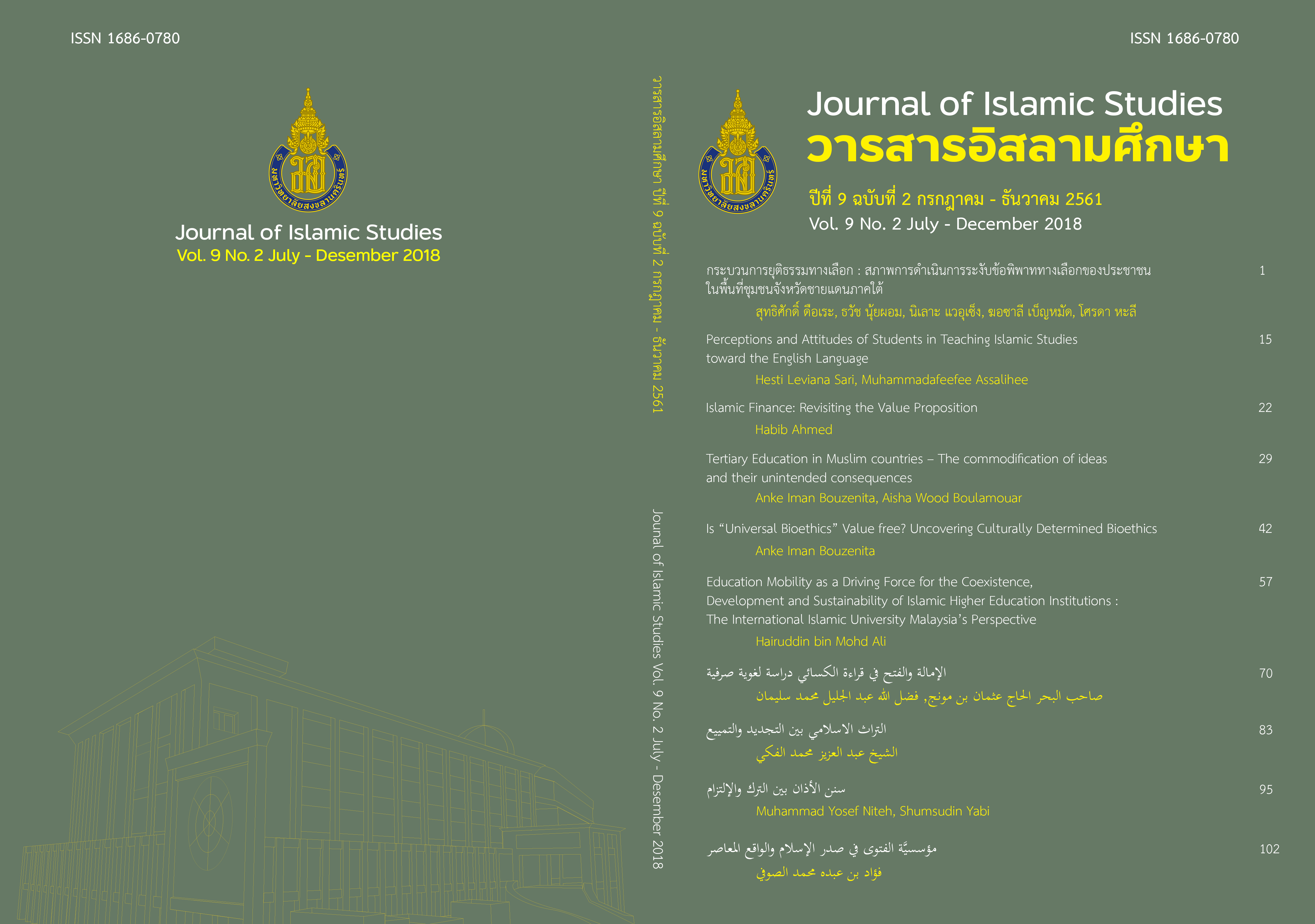Tertiary Education in Muslim Countries – The Commodification of Ideas and their Unintended Consequences
Keywords:
Islamic Education, Worldview, Commodification, Maqasid, Business Schools, Tertiary EducationAbstract
Islamic education, from a holistic point of view, is more than just the direct transmission of the pure Islamic science. It encompasses other branches of specialisation and ideally accompanies Muslims, through reflections of the Islamic worldview during their formal and informal education. This paper reflects how, in the contemporary tertiary education in the Islamic world, commodified concepts stemming from a non-Islamic worldview are being proliferated, and what the expectable results are for Muslim students.
References
Agnew, J.-C. (2003). The give-and-take of consumer culture. In S. Strasser (Ed.), commodifying everything, (pp. 11-39). London: Routledge.
Al Ghazali, Abu Hamid (1904): Al-Mustasfa min ‘ilm al-usul, Dar Qadir, Cairo.
Al Khateeb, F. (Producer). (2012, 2nd July 2017). Education in Islamic History. Retrieved from http://lostislamichistory.com/education/
Al-Shatibi, Abu Ishaq Ibrahim (2003): Al-Muwafaqat. Dar Ibn al-Qayyim.
Bennabi, Malik (2005): Les conditions de la Renaissance. Probleme d’une civilisation. Algiers, Editions ANEP.
Bohlander, M. (2014). Sisters in Law--Using Maqasd al-Shari’ah to Advance the Conversation between Islamic and Secular Legal Thinking. Arab Law Quarterly. 28(3), 257-277.
Boulanouar, Z. (2017, 3rd May 2017): The Islamic Origins of Hypothesis Testing. Paper presented at the 8th Global Islamic Marketing Conference (GIMAC8), Alanya, Turkey.
Bridges, D., & McLaughlin, T. H. (1994). Education and the market place. London: Routledge.
Chafe, W. (2013). Toward a Thought-Based Linguistics. In: Bischoff, Shannon T, Carmen Jany (Eds.) (2013). Functional Approaches to Language. Trends in Linguistics, vol 248. (pp.107-130), De Gruyter, Berlin/Boston.
Charrad, M. (2001). States and Women’s Rights: The Making of Postcolonial Tunisia, Algeria, and Morocco. London: University of California Press.
Chase, A. (1980). The legacy of Malthus; the social costs of the new scientific racism. N.p. University of Illinois Press.
Chomsky, N. (Producer) (2014, 2nd July 2017). How The Young Are Indoctrinated To Obey. Retrieved from https://chomsky.info/20141201/
Denman, C. J. (2012): Cultural divides between Arab-Muslim students and Western literature: Implications for the English Language classroom. In A. R. a. R. Al-Mahrooqi (Ed.), Literacy, Literature and Identity: Multiple Perspectives (p. 1). UK: Cambridge Scholars Publishing.
El-Din, Saif Ibrahim Tag (2013): Maqasid Foundation of Market Economics. Edinburgh: Edinburgh University Press.
Gatto, J. T. (2000). The underground history of American education. NY: Oxford Village Press New York.
Ghazali, Abu Hamid (2010). Marvels of the Heart. Book 21 of the Ihya’ ‘ulum al-din. The Revial of the religious sciences. Translated from the Arabic with an introduction and notes by Walter James Skellie. Fons Via, Kentucky.
Habib, R. (1993). Modernizing vs Westernizing the social sciences: The case of psychology In A. M. Elmessiri (Ed.). Epistemological bias in the physical and social sciences, (pp.126-144).
Hatcher, R. (2006): Privatization and sponsorship: the re-agenting of the school system in England 1. Journal of Education Policy, 21(5), 599-619.
Hegazy, H. (2006). Bias in Curricula and Course Contents. In A. E. Messeri (Ed.), Epistemological Bias in the Physical and Social Sciences (pp. 145-157). London, UK: International Institute of Islamic Thought (IIIT).
Hogan, A., Sellar, S., & Lingard, B. (2016). Commercialising comparison: Pearson puts the TLC in soft capitalism. Journal of Education Policy, 31(3), pp. 243-258.
Hussain, F., & Bouzenita, A. I. (2011). Squaring the Circle: A Critique of the Islamisation of the Human Sciences Project. Islamic Studies, 50(3/4), pp. 347-364
Ibn Khaldun (1958). The Muqaddimah, An Introduction to History (F. Rosenthal, Trans.). NY: Pantheon Books Inc.
Marx, K. (1975). Capital (Vol. 1). N.p. n.p.
Pennycook, A. (1998). English and the discourses of colonialism. London: Routledge.
Rice, G. (1999). Islamic Ethics and the implications for business. Journal of Business Ethics, 18(4), 345-358.
Roberts, P. (1994). Business sponsorship in schools: a changing climate. Education and the market place, (p. 79).
Robinson, K. (2011). Out of our minds: Learning to be creative. Oxford: Capstone. John Wiley & Sons.
Sahlberg, P. (2014) Finnish lessons 2.0: What can the world learn from educational change in Finland? New York,NY: Teachers College Press.
Smith, A. (1776). An inquiry into the wealth of nations, London: W. Strahan and T. Cadell.
Strasser, S. (2003). Commodifying everything: relationships of the market (Vol. 4) New York, NY: Routledge.
Tan, Mary, and Ong Saw Lan (2011). Teaching mathematics and science in Malaysian classrooms: The impact of teacher beliefs on classroom practices and student learning, Journal of English for Academic Purposes, 10(1), 5-18.
Universities UK (6 March 2017). International students now worth £25 billion to UK economy- new research. Retrieved from http://www.universitiesuk.ac.uk/news/Pages/International-students-now-worth-25-billion-to-UK-economy---new-research.aspx
Zarqa, M. A. (2003). Islamization of economics: The concept and methodology. Islamic Economics, 16(1), 3-42.
Downloads
Published
How to Cite
Issue
Section
License
All articles Published in The Journal of Islamic Studies are author’s opinions, and not the responsibility of the Faculty of Islamic Sciences nor the editorial board. However any citation should be referred to the journal.


